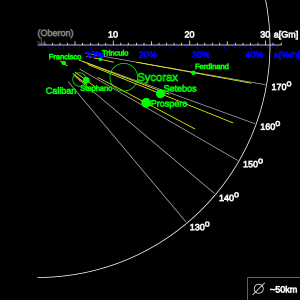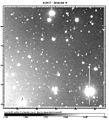Sycorax (moon) facts for kids
| Discovery | |
|---|---|
| Discovered by | Philip D. Nicholson, Brett J. Gladman, Joseph A. Burns, John J. Kavelaars |
| Discovery date | September 6, 1997 |
| Orbital characteristics | |
|
Mean orbit radius
|
12,179,000 km |
| Eccentricity | 0.5224 |
| 1288.28 d | |
| Inclination | 159° (to the ecliptic) |
| Satellite of | Uranus |
| Physical characteristics | |
|
Mean radius
|
12,179,000 km |
| ~70,000 km² (estimate) | |
| Volume | ~1,800,000 km³ (estimate) |
| Mass | ~5.4×1018 kg (estimate) |
|
Mean density
|
~1.5 g/cm³ (estimate) |
| ~0.040 m/s2 (estimate) | |
| ~0.087 km/s (estimate) | |
| Albedo | 0.04 (assumed) |
Sycorax is one of the many moons that orbit the planet Uranus. It's the largest moon of Uranus that moves "backwards" (which is called retrograde) and isn't perfectly round like a ball.
Scientists found Sycorax on September 6, 1997. The team included Brett J. Gladman, Philip D. Nicholson, Joseph A. Burns, and John J. Kavelaars. They used a very powerful telescope called the 200-inch Hale telescope to spot it. At the same time, they also discovered another moon named Caliban. When it was first found, Sycorax was given the temporary name S/1997 U 2.
Later, Sycorax was officially named Uranus XVII. It got its name from Sycorax, who is Caliban's mother in William Shakespeare's famous play The Tempest.
Sycorax's Orbit
Sycorax orbits very far away from Uranus. It's more than 20 times farther from Uranus than the moon Oberon, which is the farthest of Uranus's "regular" moons.
Sycorax's orbit is retrograde, meaning it moves in the opposite direction to Uranus's rotation. Its path is also quite inclined (tilted) and eccentric (not a perfect circle, more like an oval).
Scientists think Sycorax might have come from the same place as two other moons, Setebos and Prospero. This is because their orbits are quite similar.
Physical Features
Sycorax is estimated to be about 150 kilometers (about 93 miles) wide. This makes it the biggest moon of Uranus that isn't perfectly round. It's similar in size to Himalia, which is Jupiter's largest non-round moon.
Scientists have tried to figure out how fast Sycorax spins, but it's hard to tell exactly. Their best guess is that it spins around once every 4 hours.
Related pages
Images for kids
See also
 In Spanish: Sicorax (satélite) para niños
In Spanish: Sicorax (satélite) para niños
 | Tommie Smith |
 | Simone Manuel |
 | Shani Davis |
 | Simone Biles |
 | Alice Coachman |



